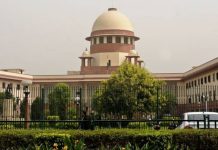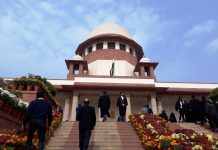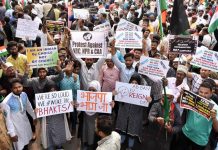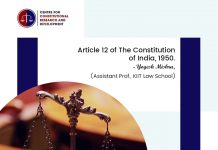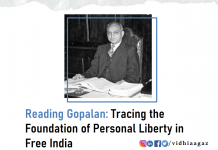INTRODUCTION
India is a multi-cultural country where people of different mindsets live under one common system of law and government, with no other country having such a diversity of people and cultures. When people of different cultures live under the same roof, conflicts are bound to happen. In furtherance of preventing these conflicts, preventive detention is a mechanism used by countries to curb the happening of unwanted activities, which might consequently harm the society. But nowadays, due to embezzlement of the preventive detention mechanism by the government authorities, the essence of preventive detention is being questioned as being right or for being an invasion of one’s individual liberty.
PREVENTIVE DETENTION: INDIA
Different countries use preventive detention during war periods. Similarly, in British India, it was used during the war period to curb violence occurring in the country. Apart from periods of war, no country other than India has a mention of preventive detention in its constitution.
A clear analogy can be seen in Article 21 and Article 22 of Indian Constitution wherein Article 21 provides for the right to life and liberty and Article 22 provides for preventive detention under which liberty of persons can be restricted but only by a procedure established by law.
The International Covenant on Civil and Political Rights, while providing for arbitrary arrest and detention under Article 9, states that no one shall be arrested and detained arbitrarily, meaning without following due process and a just procedure. India, being a party to the Covenant and in the course of ratifying it, had to make some changes to Article 22 and its preventive detention laws. These changes were subsequently made and passed by the Constitution (Forty-fourth Amendment) Act, 1978 but have still not been enforced.
POSITIVE CONCEPT OF LIBERTY
The idea of liberty can vary from person to person. There are two famous concepts of liberty, “positive liberty” and “negative liberty”.[1]Negative liberty is subjective for it is concerned with the choices one makes when there are different options available and it also favors non-intervention by the State. Positive liberty, on the other hand, is a somewhat objective concept which focusses on the consequence to be achieved. Further, it favors the idea of state intervention thereby restricting ones choices.[2]
For instance, if freedom is given to every individual to do what he wants, what would the consequences be if his acts or choices are inherently dangerous to the society? When rights of the community are in jeopardy, state intervention with the rights of individuals would then seem right in order to protect the collective or greater interest of the society and the state.
Therefore, the basis for the introduction of preventive laws in the Indian Constitution lies in the positivist and state-interventionist approach, which also clearly define the restrictions under various articles. The reason behind the same could be attributed to individuals being seen as part of a collective group, the society, in contrast to the laws of the U.S. where personal liberty has been secured under the 14th Amendment which guarantees rights against executive interference as well as from legislative interference.[3]
LOOPHOLES IN THE INDIAN PREVENTIVE DETENTION LAWS
Article 22 of the Indian Constitution provides for “safeguards from the arbitrary arrest and detention” but lacks in certain aspects. The justification under the Article is not given on any legal evidence, like in criminal cases. The only reason for such detention rests on the suspicion that the detenu might commit some act in the future which may endanger the security of the state.[4]
Earlier, the draft constitution consisted of the words “due process” under Article 21 which was later changed owing to the opinion of Rau. He believed that “due process” accommodated a positive concept providing for procedural safeguard against unwanted detention by the government and gave power to the judiciary to invalidate laws framed by majorities in the Parliament which was considered as undemocratic.[5]
These laws under clause (4) and (5) of Article 22 of the Indian Constitution provide for certain procedural safeguards to persons detained under preventive detention. They provide for the opinion of the advisory board to be taken to detain a person beyond a period of 3 months. However, clause (5) can be curtailed if the authority is of the view that disclosing the opinion would harm the public interest. It is one of the most contrary clauses for a basic right of a person is taken away. This right is one of the most crucial rights given to an arrested or detained person under the International Covenant on Civil and Political Rights.[6]India, being a party to it, still hasn’t enforced the right given under Principle 9 of the ICCPR.
Principal 4 of the United Nation General Assembly on “protection of person under any form of detention or imprisonment,” to which India is a party, provides that “any form of detention or imprisonment and all measures affecting the human rights of a person under any form of detention or imprisonment shall be ordered by, or be subject to the effective control of, a judicial or other authority”[7] The Indian preventive detention law provides for constitution of an advisory board to listen to the representation made by a detained person but the advisory board, however, does not abide by the criteria prescribed under Article 22.
Yet another absurd aspect of the preventive detention law is that it permits the court to see only the procedure of detention and not the correctness or reason for such suspicion that led to the detention. Nevertheless, the judiciary is now taking measures to enforce the procedural requirements which shall, however, have a long way to go owing to immense powers of the parliament and executives under these laws.
In Huidrom Konungjao Singh case[8], the court held that personal liberty is sacrosanct and the state authorities without proper and correct procedure if take away one’s liberty, it would be violative of Article 21 and Article 22 of the Indian Constitution.
Court from time to time has enforced various rights and safeguards available. For instance, Clause (5) of Article 22 talks about the communication to be made to the detained person at the earliest. The court in Smt. Shalini Soni v. Union of India & Ors.[9] held that if such a procedural requirement has not been borne, it would make the whole detention illegal.
CONCLUSION
Thus, it can clearly be seen how judicial activism by the courts in India has protected the civil and individual liberties guaranteed by the Constitution. There are certain restrictions on individual liberty which have rightly been upheld by the court to protect the security of the state and its relation with other states. As no rights can be absolute, there ought to be a balance between restrictions imposed by the state and individual liberty. It is the security of the state which requires police to be vested with the power to make lawful arrests, and on similar lines, individuals should also have the power to withstand and question the unlawful arrest.
It can, therefore, be concluded that the state should provide and try to achieve a balance between individual rights and liberties. No individual can be given a right to do what he wishes because no right is absolute and as the state is the custodian of peace and harmony for its citizens, it shall have the right to restrict such liberty in case of any violations.
Footnotes
[1]Theodore L. Putterman, Berlin Two Concepts Of Liberty – A Reassessment and Revision, Polity, 38 Palgrave J. 417-418, (2006).
[2]Id.
[3] Ibid
[4] Liversi v. Anderson, 1942 (U.K.), AC 206; see also A.K. Gopalan v. State of Madras, AIR 1950 SC 27 (India)
[5] Manoj Mate, The Origins of Due Process in India: The Role of Borrowing in Personal Liberty and Preventive Detention Cases,28 Berkeley J. Int’l L. 216,219-220, (2010).
[6] Claire Macken, Preventive Detention and the Right of Personal Liberty and Security under the International Covenant on Civil and Political Rights, 26 Adel. L. Rev. 1, 16-19 (2005)
[7] Principle 4 of United Nation General Assembly “Body of principles for the protection of all persons under any form of detention or imprisonment”
[8] Huidrom Konungjao Singh v. State of Manipur, 2012, 75 SCC 181C
[9] Smt. Shalini Soni etc. v. Union of India & Ors etc. (1981), AIR 431







